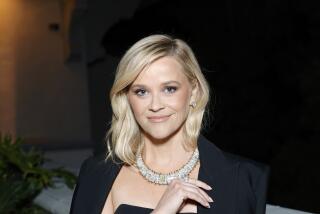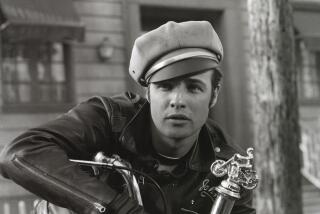Review: ‘Wild’ takes Reese Witherspoon into raw, bracing new territory
- Share via
“Wild” opens high atop the Pacific Crest Trail, where at first all the eye can see is the sweeping beauty of a rugged land, unmarred and untamed. The scene is breathtaking, serene, until it is broken by pain and pierced by a scream.
The pain comes from Cheryl Strayed, portrayed by a wonderfully worn down and unwashed Reese Witherspoon, hiking too many miles in boots that don’t fit. The scream, full of defiance and frustration, is forged by a life that doesn’t fit either.
It is in moments like these that director Jean-Marc Vallée’s compassion for the human condition, Nick Hornby’s skin-scraping and soul-baring adaptation of Strayed’s memoir, and Witherspoon’s pure emotional nakedness merge, piercing, like that scream. Though there are occasional stumbles along the 1,100-mile hike, the peaks in “Wild” make the journey more than worth it.
The film unfolds in 1995 at a time when the 26-year-old Strayed has hit rock bottom. Her mother has died, her marriage has too, and if she doesn’t stop the destructive behavior, she will join them. A guide to hiking the Pacific Crest Trail catches her eye, and she soon becomes convinced it holds her redemption. Alone on the trail she can reclaim her life, find her true self.
Strayed unflinchingly recounts the journey in her inspiring bestseller and also gives Witherspoon the role she has needed for a while. In Cheryl, the actress once again has someone of complexity and emotional heft, but of a very different sort than her Oscar-winning performance as persevering June Carter Cash in “Walk the Line.”
Both filmmaker and star prove agile in walking both sides of the line in “Wild,” mining the physical journey itself with the kind of exhausting physical extremes a hike like this presents, and the emotional layers that underpin it. They take full advantage of one of the central appeals of Strayed’s story — that whatever rough patches the Pacific Crest might hold, her blend of moxie and off-handed telling make the hike seem almost doable, putting her empowerment experience within reach.
Throughout there is ever the reminder that the trail requires the kind of grit needed to survive with whatever you can carry on your back. In this case, it is a towering pack that fellow trekkers dub “the monster.” Shouldering that heavy load, which looks to outweigh Witherspoon, is one of the lighter, ironic reprieves seeded through the film.
These moments temper the flashbacks, tracing Cheryl’s years of bad circumstances and bad choices: Growing up in rural poverty. Escaping the violent drunk of a stepfather. Her mother (an excellent Laura Dern), adoring and irrepressibly optimistic, felled young by a fast-moving cancer. Her volatile marriage to and divorce from Paul (Thomas Sadoski). The drugs, including a heroin addiction. The indiscriminate sex.
The angst and anxiety emerge in bits and pieces, the flashbacks sparked by the kind of introspection you would expect along the trail.
It is a kind of hard-edged character that Witherspoon has been working her way toward in recent years in films such as “Mud,” and earlier this year, “The Good Lie,” while shedding some of the less flattering romantic-comedy baggage she’s taken on, like the coal in the stocking of 2008’s “Four Christmases.”
Taking this risk was a calculated one — the actress optioned the book before publication — suggesting there is a more interesting career still in the making.
Vallée, along with an excellent crew that includes director of photography Yves Belanger, who last worked with the director on the Oscar-winning “Dallas Buyers Club,” production designer John Paino, costume designer Melissa Bruning and music supervisor Susan Jacobs, find a good balance between “Wild’s” two narrative threads — what Cheryl was and what she is becoming. The difficulties of the hike help keep sentimentality in check. A special nod to visual effects supervisor Marc Cote, or whoever is responsible for the loose toenail that becomes such a defining moment.
Though Cheryl is the spine and Witherspoon very much earns her space as the star, there are many fine characters and performances woven in along the way. The one that casts the longest shadow is Dern as Cheryl’s mother, Bobbi, a portrait of strength and vulnerability that is earning the actress well-deserved awards attention. Sadoski is rock-solid as Cheryl’s still-caring ex.
But many of the best scenes come from Cheryl’s encounters with strangers. An interlude with Michiel Huisman, as Jonathan, a late-in-the-journey romance, exposes the chafing and the healing that has taken place. Impossible to forget is Frank (W. Earl Brown), a desert farmer who picks up an exhausted and starving Cheryl and takes her home for dinner one night. The laughter and the conversation around that humble table are a reminder of how the universe and the people in it provide unexpected and much-needed solace in troubled times.
You can sense Vallée’s evolution as a filmmaker in scenes like that. In “Wild,” he makes more room for subtlety, helped by Hornby’s gift with dialogue (Oscar-nominated for “An Education”). The director also makes better choices in the film’s ancillary players, unlike in “Dallas Buyers Club,” which rested so heavily on Matthew McConaughey and Jared Leto, who both earned Oscars for their effort.
Witherspoon benefits greatly from “Wild’s” richly curated world, so that scream on the Pacific Crest ridge echoes through the film — primal, hurtful, healing, earned. It is raw rather than perfect. It is wild.
More to Read
Only good movies
Get the Indie Focus newsletter, Mark Olsen's weekly guide to the world of cinema.
You may occasionally receive promotional content from the Los Angeles Times.











